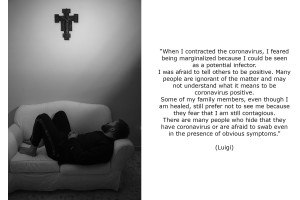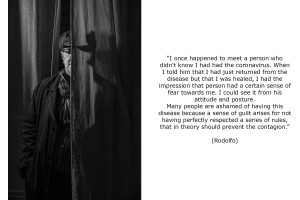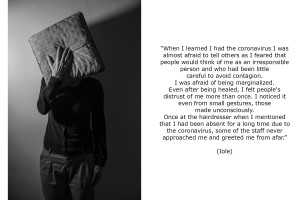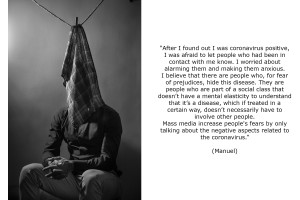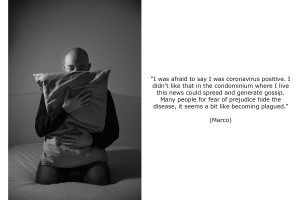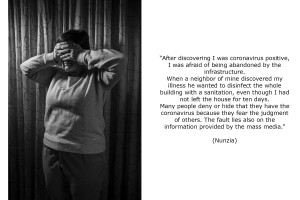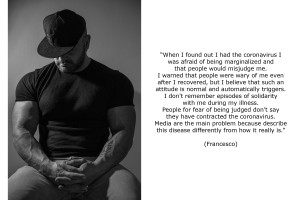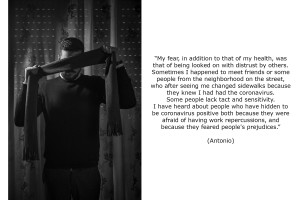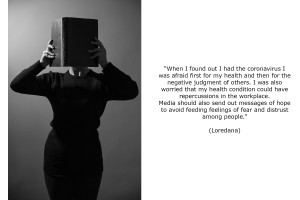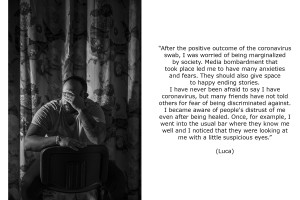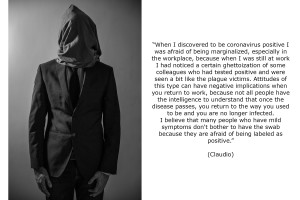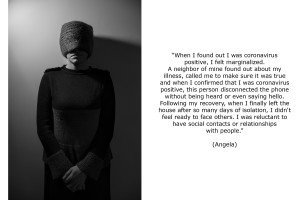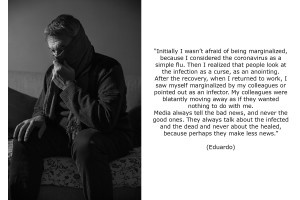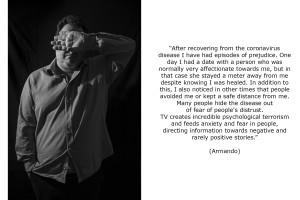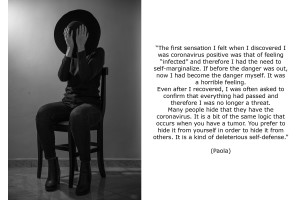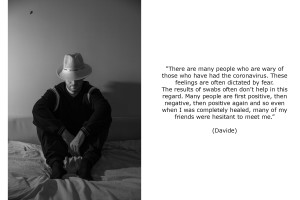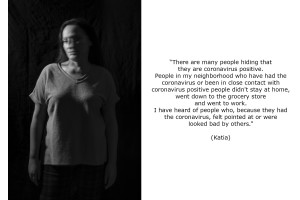Italy is one of the most affected countries in the world by the coronavirus pandemic. People who contract this disease are forced to pay a double price: the first from a physical point of view and the second from a social point of view.
The current coronavirus pandemic is causing social stigmatization and discriminatory behavior against anyone who has perceived having been in contact with the virus.
The term "stigma" in social psychology indicates the attribution of negative qualities to a person or a group of people. The stigma is often based on lack of information, ignorance, unfounded beliefs, irrational fears and of course it can be fomented by media through inadequate communication.
According to the World Health Organization, it is important to contain social stigma in order to avoid more serious health problems and difficulties in controlling the epidemic. The risks are determined by the greater probability that, in a hostile environment, a sick person decides to hide the disease or delay in requesting help in order not to incur discrimination.

Luigi (30) discovered he was coronavirus positive after having a strong cough in late October 2020. After the positive result of the swab, he feared being marginalized because he could be seen as a potential infector. He was afraid to tell others to be positive. He thinks that many people are ignorant of the matter and may not understand what it means to be coronavirus positive. Some of his family members, even though he is healed, still prefer not to see him because they fear that he is still contagious. According to Luigi there are many people who hide that they have coronavirus or are afraid to swab even in the presence of obvious symptoms.

Rodolfo (59) found out he was coronavirus positive following a sudden fever. He once happened to meet a person who didn’t know he had had the coronavirus. When he told him that he had just returned from the disease but that he was healed, he had the impression that person had a certain sense of fear towards him. He could see it from his attitude and posture. According to Rodolfo many people are ashamed of having this disease because a sense of guilt arises for not having perfectly respected a series of rules, that in theory should prevent the contagion.

Iole (37) discovered she was coronavirus positive following a sudden fever. After the positive result of the swab she was almost afraid to tell others as she feared that people would think of her as an irresponsible person and who had been little careful to avoid contagion. She was afraid of being marginalized. Even after being healed, Iole felt people’s distrust of her more than once. She noticed it even from small gestures, those made unconsciously. Once at the hairdresser when she mentioned that she had been absent for a long time due to the coronavirus, some of the staff never approached her and greeted her from afar.

Manuel (33) found out he was coronavirus positive on October 2020. He was afraid to let people who had been in contact with him know. He worried about alarming them and making them anxious. He believes that there are people who, for fear of prejudices, hide this disease. According to Manuel, media increase people’s fears by only talking about the negative aspects related to the coronavirus.

Marco (34) found out he was coronavirus positive by taking a rapid test before hospital therapy that had nothing to do with covid19. He was afraid to say he was coronavirus positive. He didn’t like that in the condominium where he lives this news could spread and generate gossip. Marco thinks that many people for fear of prejudice hide the disease, because it seems a bit like becoming plagued.

Nunzia (36) discovered she was coronavirus positive in early October 2020. She was afraid of being abandoned by the infrastructure. When a neighbor of her discovered her illness he wanted to disinfect the whole building with a sanitation, even though she had not left the house for ten days. According to Nunzia many people deny or hide that they have the coronavirus because they fear the judgment of others. She thinks that the fault lies also on the information provided by the mass media.

Francesco (37) realized he had contracted the coronavirus in early October 2020, when he felt very tired while he was at work. The following day he went for a swab which then tested positive. He was afraid of being marginalized and that people would misjudge him. He warned that people were wary of him even after he recovered, but he believes that such an attitude is normal and automatically triggers. He doesn’t remember episodes of solidarity with him during his illness. Francesco thinks that people for fear of being judged don’t say they have contracted the coronavirus. For him media are the main problem because describe this disease differently from how it really is.

Antonio (23) discovered he was coronavirus positive on October 2020. His fear, in addition to that of his health, was that of being looked on with distrust by others. Sometimes he happened to meet friends or some people from the neighborhood on the street, who after seeing him changed sidewalks because they knew he had had the coronavirus. According to Antonio some people lack tact and sensitivity. He has heard about people who have hidden to be coronavirus positive both because they were afraid of having work repercussions, and because they feared people’s prejudices.

Loredana (27) found out she was coronavirus positive in late October 2020. She was afraid first for her health and then for the negative judgment of others. She was also worried that her health condition could have repercussions in the workplace. Loredana thinks that media should also send out messages of hope to avoid feeding feelings of fear and distrust among people.

Luca (34) discovered he was coronavirus positive in late October 2020. He was worried of being marginalized by society. He had never been afraid to say he had coronavirus, but many friends of him hadn’t told others for fear of being discriminated against. Luca became aware of people’s distrust of him even after being healed. Once, for example, he went into the usual bar where they know him well and he noticed that they were looking at him with a little suspicious eyes.

Claudio (35) found out he was coronavirus positive after taking a swab following the positivity of his partner. When he discovered to be coronavirus positive he was afraid of being marginalized, especially in the workplace, because when he was still at work he had noticed a certain ghettoization of some colleagues who had tested positive and were seen a bit like the plague victims. According to Claudio, attitudes of this type can have negative implications when you return to work, because not all people have the intelligence to understand that once the disease passes, you return to the way you used to be and you are no longer infected. He believes that many people who have mild symptoms don’t bother to have the swab because they are afraid of being labeled as positive.

Angela (41) found out she was coronavirus positive in early October 2020. She felt marginalized. A neighbor of her found out about her illness, called her to make sure it was true and when she confirmed that she was coronavirus positive, this person disconnected the phone without being heard or even saying hello. Following the recovery, when Angela finally left the house after so many days of isolation, she didn’t feel ready to face others. She was reluctant to have social contacts or relationships with people.

Eduardo (60) found out he was coronavirus positive after having some flu symptoms following the flu vaccine. Initially, after the positive result of the swab he wasn’t afraid of being marginalized, because he considered the coronavirus as a simple flu. Then he realized that people look at the infection as a curse, as an anointing. After the recovery, when he returned to work, he saw himself marginalized by his colleagues or pointed out as an infector. His colleagues were blatantly moving away as if they wanted nothing to do with him. According to Eduardo media always tell the bad news, and never the good ones. They always talk about the infected and the dead and never about the healed, because perhaps they make less news.

Armando (50) discovered he was coronavirus positive in early October 2020. After recovering from the coronavirus disease he have had episodes of prejudice. One day he had a date with a person who was normally very affectionate towards him, but in that case she stayed a meter away from him despite knowing he was healed. In addition to this, he also noticed in other times that people avoided him or kept a safe distance from him. According to Armando many people hide the disease out of fear of people’s distrust. TV creates incredible psychological terrorism and feeds anxiety and fear in people, directing information towards negative and rarely positive stories.

Paola (34) discovered she was coronavirus positive after taking a swab following some suspicious symptoms. The first sensation she felt when she discovered to be coronavirus positive was that of feeling “infected” and therefore she had the need to self-marginalize. She describes it like a horrible feeling. Even after she recovered, she was often asked to confirm that everything had passed and therefore she was no longer a threat. Paola thinks that many people hide that they have the coronavirus. It is a bit of the same logic that occurs when you have a tumor. You prefer to hide it from yourself in order to hide it from others. It is a kind of deleterious self-defense.

Davide (26) found out he was coronavirus positive after the summer holidays, on late August 2020. He thinks that there are many people who are wary of those who have had the coronavirus. These feelings are often dictated by fear. According to Davide the results of swabs often don’t help in this regard. Many people are first positive, then negative, then positive again and so even when he was completely healed, many of his friends were hesitant to meet him.

Katia (41) discovered she was coronavirus positive in late October 2020. She thinks that there are many people hiding that they are coronavirus positive. People in her neighborhood who have had the coronavirus or been in close contact with coronavirus positive people didn’t stay at home, went down to the grocery store and went to work. She has heard of people who, because they had the coronavirus, felt pointed at or were looked bad by others.
